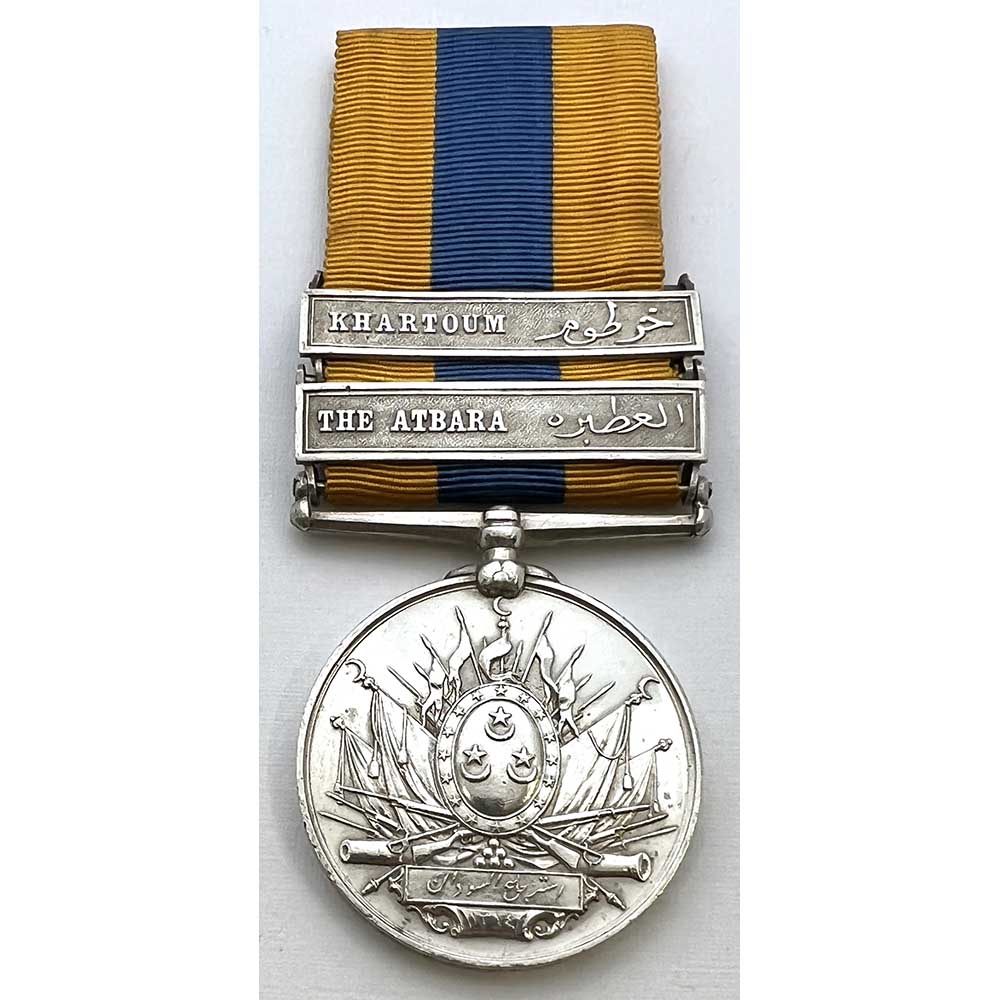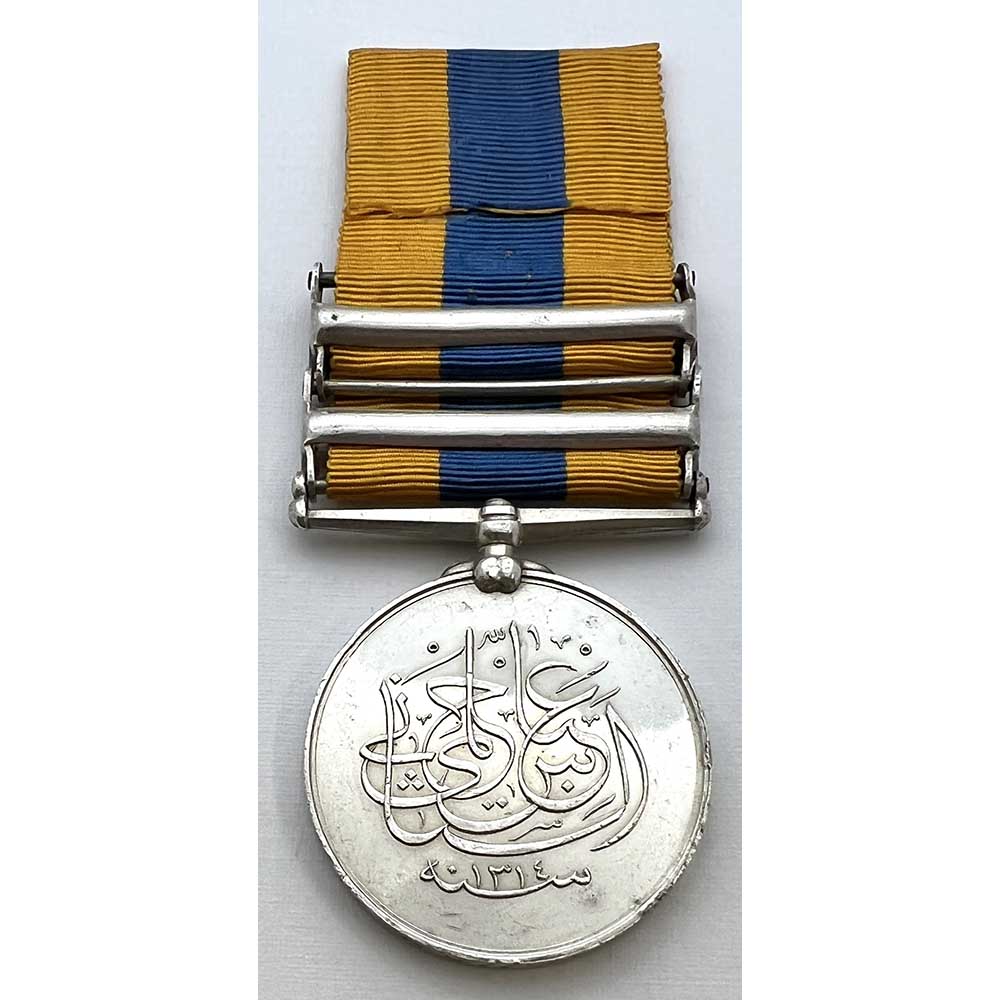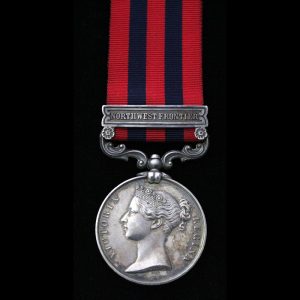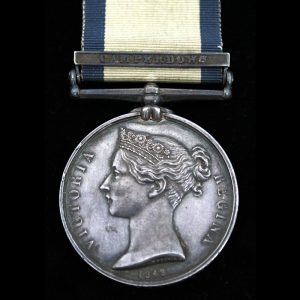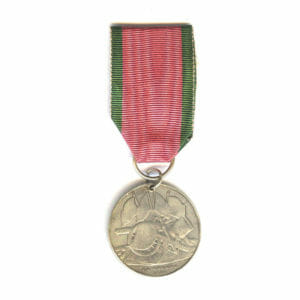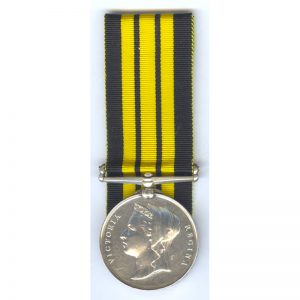Description
Khedive’s Sudan Medal, 2 bars, The Atbara, Khartoum, 3450 Pte Frederick Kilham, 1st Lincoln Regt.
Officially engraved: “3450 Pte F. Kilham. 1 Linc. Regt:”
Confirmed on the medal roll as present in the Atbara Campaign of 1898 and Expedition to Khartoum (Battle of Omdurman), earning both clasps.
Served in the Lincolns as 3450, served as Corporal No 14974 7th Battalion Dublin Fusiliers.
Frederick Kilham returned to service in WW1 with the 7th Dublin Fusiliers, 8 days after landing in Gallipoli, he was killed in action. He was about 43 years old.
It reads:
SUVLA – From an unknown 7th Dublins Pal at Suvla Bay – 10th (Irish) Division, IX Corps – With the exception of 11th Manchester’s advance during the 6/7th August, Kiretch Tepe (also known as Kizlar Dagh) was paid little attention by either side. But with failure and stalemate on the plains below, attention was soon turned to this ridge. The attack by the Irish on 15th August brought limited success on the northern slopes and, along the crestline, the Turkish defensive work known as The Pimple had been captured.
During the night of 15/16th August the Turks began a series of ferocious bomb and bayonet attacks. The Irish and English troops resisted gallantly and, with grim determination, held back the Turkish onslaught. But soon their meagre supply of jam tin bombs, that the Irish had been using, ran out. This critical point in the defence witnessed men bravely trying to catch and throw back the Turkish bombs, and in frustration sometimes even rocks. It was soon realised that the Irish position was one of hopelessness; blood and brawn would not be enough.
An unknown account of the battle by a 7th Dublin Pals man at the battle:
"The platoon was rushed into that deadly corner on the ridge overlooking the Gulf of Saros about an hour before daylight. The place was already a shambles and we could almost shake hands with the Turks, who were behind the low stone earthwork armed with bombs.
I remember how sore my shoulder had become with firing, when three bombs, one after the other, fell four feet away among the stones on the steep slope of the ridge. After scrambling to reach the third as it rolled, I received a blow in the chest from the explosion which made me helpless for about eight hours.
I remember the 7th Dublin’s being relieved, but could not follow, and saw dead and wounded in the grass and scrub fire that took place subsequently.
Failing to get more than a few yards towards safety, I decided to lie in the scrub all night and at dawn make good my escape. I had no water, as my water-bottle had been smashed by a bomb.
Next morning, after much trouble and excitement avoiding hidden snipers, whose bullets often whizzed unpleasantly close, I found water, and safety, by getting down the cliff to the beach – travelling along the latter waist-deep in water sometimes, and then swimming round the headland, where the Navy were very busy pumping fresh water ashore."
Mr Frederick Kilham, was born circa 1872 in Tydd Gote, Parish of Tydd St Mary in Wisbech, Lincolnshire.
At 20, having been a Stick Maker, he attested for service on 30th December 1892 at Aldershot for the Lincolnshire Regiment.
He saw the following service:
Home, 29th Feb 1892 – 11th Dec 1893
Straits Settlements, 12th Dec 1893 – 18th April 1895
Malta, 19th April 1895 – 3rd Feb 1897
Egypt, 24th Feb 1897 – 7th November 1898
India, 8th November 1898 – 16th February 1902
South Africa, 17th February 1902 – 14th September 1902
Home, 15th September 1902 – 28th December 1904.
Served in the Nile Expedition of 1898 at the “Battle of Atbara 8th April 1898, Khartoum 2nd September 1898”
Caught the end of the Boer War, earning the QSA bar South Africa 1902 with 2nd Battalion Lincolnshire Regiment.
Having been discharged after his 12 years of service, he ended up in Wiltshire with his wife Bertha, working the difficult job of “Asylum Attendant” at Wilts County Asylum.
During WW1 he was already over 40 years old but still joined the Royal Dublin Fusiliers, going to Gallipoli with the 7th (Service) Battalion, Dublin Fusiliers, known as the Dublin Pals.
Officially landed according to his Medal index card for service in Gallipoli on 9th August 1915.
He lasted a total of 8 days before he was listed as Killed in Action, his body and effects never being found, that day he was amongst the missing who were presumed killed and never returned.
Full entitlement:
Queen’s Sudan Medal, 1st Lincolnshire
Khedive’s Sudan, 2 bars (This medal)
Queen’s South Africa Medal, bar SA 1902, 2nd Lincolnshire Regiment
1914-15 Star, British War Medal, Victory Medal Trio, 7th Battalion Dublin Fusiliers
Bronze Memorial Plaque, “Frederick Kilham”
